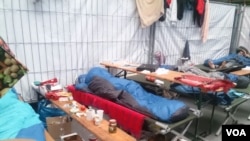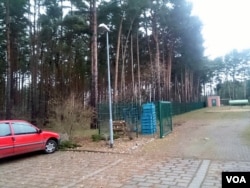Before fleeing his home in Syria for Europe, 22-year-old Abdullah was a chef, making Arabic, European and Asian cuisine.
Since he arrived in Germany in early August, he has done nothing but wait in this isolated eastern German refugee camp — a converted gym surrounded by thick forest.
Abdullah won't be interviewed until April to determine his legal status. He expects to be granted asylum because he is Syrian.
“This guy,” said Abdullah, indicating another camp resident, "came here after me and he already had his appointment.”
As European countries debate how many people can be accommodated, refugees say the sluggish bureaucracy, not the crowds coming in, is straining the system. Even the lucky newcomers wait for months to be processed through the refugee system before they can begin to study German full time and prepare to apply for jobs or to schools.
Despite fears that more new arrivals will further slow the system, and then later create more competition for work or school placement, the young men at this camp were not willing to accept the idea that refugees fleeing war should be stopped.
“I came here,” said 22-year-old Wagdi, “So all people have the same rights to come here.”
Having the right to apply for asylum in Germany, added Wagdi, does not mean that everyone who comes will find what he or she is looking for, namely peace and relative prosperity.
The flow of refugees and other migrants into Germany is expected to increase the country’s economic growth this year, according to the European Commission; but, with more than a million newcomers expected in 2015, Wagdi says he worries the country is not prepared.
“If they allow everyone to come to Germany,” he said, “and their economy is not ready, it will be a problem.”
On the other side of the country, in Germany’s more urban western half, other refugees say that even if European governments and Turkey limit the number of people coming in, the influx will continue.
“If they don’t want us, what can we do?” asked Hashem, a 17-year-old Syrian living in a camp in Mannheim. “What? We will just then live in the sea?”
Currently, there are roughly 60 million refugees and displaced people in the world, the highest number since World War II, according to the United Nations.
“Globally, one in every 122 humans is now either a refugee, internally displaced, or seeking asylum,” reads a statement on the U.N. refugee agency website. “If this were the population of a country, it would be the world's 24th biggest.”
Some young men at this camp in eastern Germany said the numbers also point to another truth: the majority of the people on Earth have not fled their homes. And those who have usually say they had “no choice.”
“We all want to go back home after the war,” said Khader, leaning over his school cafeteria-style chair and waving toward a group of friends, all from the Islamic State-controlled city of Deir Ezzor in Syria. All were smuggled out of Syria, and none can return while extremist militants control their home city.
When asked what life was like before they left, the young men called out injustices. “Shaving is forbidden. Short pants are forbidden. Smoking is forbidden,” they said. But these indignities would not have driven them from their homes, added Abdel Kareem.
“They’re extremely violent,” he said. “They make gardens out of human heads.”






